|
Dusty Dog Reviews The whole project is hip, anti-academic, the poetry of reluctant grown-ups, picking noses in church. An enjoyable romp! Though also serious. |
|
Nick DiSpoldo, Small Press Review (on Children, Churches and Daddies, April 1997) Children, Churches and Daddies is eclectic, alive and is as contemporary as tomorrow’s news. |



|
Kenneth DiMaggio (on cc&d, April 2011) CC&D continues to have an edge with intelligence. It seems like a lot of poetry and small press publications are getting more conservative or just playing it too academically safe. Once in awhile I come across a self-advertized journal on the edge, but the problem is that some of the work just tries to shock you for the hell of it, and only ends up embarrassing you the reader. CC&D has a nice balance; [the] publication takes risks, but can thankfully take them without the juvenile attempt to shock. |
|
from Mike Brennan 12/07/11 I think you are one of the leaders in the indie presses right now and congrats on your dark greatness. |
Volume 243, May/June 2012
|
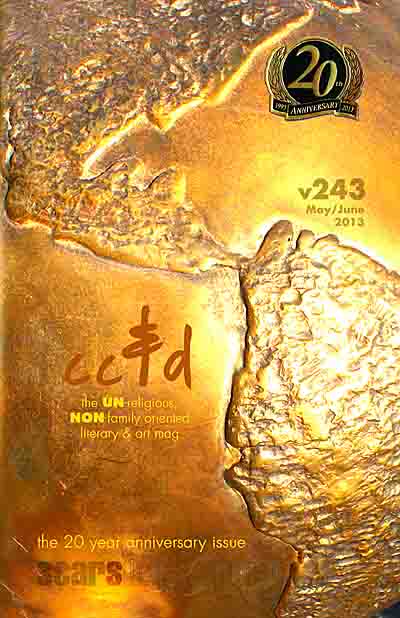
see what’s in this issue...
Note that in the print edition of cc&d magazine, all artwork within the pages of the book appear in black and white.
|
Order this issue from our printer as a paperback book (5.5" x 8.5") perfect-bound w/ b&w pages |

|
the boss lady’s editorial the Transformation of cc&d |
The Transformations of cc&dJanet Kuypers(edited and expanded from the introduction to the book “Finally, Literature for the Snotty and Elite”, v1 of a cc&d collection book of Kuypers’ writings) In the beginning of cc&d (June 1993) there weren’t that many contributors, so a lot of my work appeared in early issues. But even in that first year, we started getting more and more submissions, because volume 19 (April/May 1994, which translates to nearly two issues per month) was the first magazine cover with a wrap cover. We started posting internet issues in 1995 (at eworld, later aol), and we found ourselves releasing two to three issues monthly because we had so many good contributions (in 1994 we even ran the section called “Down in the Dirt” of additional poems in cc&d magazine), and volume 55 (our second anniversary issue of June 1995 as our only gatefold cover) started showing more political angles with cover art and content... Because we saw the growing interest for magazine issues, I purchased a slew if ISBN#s from the U.S. Government and started releasing collections of writings from issues of cc&d, along with chosen additional writings from other authors that appeared in the front of each collection book (and at the beginning we decided to give the titles a similar theme as well, like "Sulphur & Sawdust” in 1995, or “Slate & Marrow” in 1996, or “Blister & Burn” in 1997), because we were already looking for ways to expand the base for cc&d’s accepted authors (even at times including translations of poems into other languages). So by volume 75 (January 1996) we changed our format from 5.5"x8.5" to 8.5"x11", adding an expanded news section, a political news section, the occasional AIDS Watch section, a letters to the editor section, a lunchtime poll topic, and a philosophy monthly section. We even started including sections of Scars books in issues (since we had the room in the ~100+ monthly issues). But when I was leaving to travel the country for nearly a year starting in the end of 1997, I decided to produce 6 issues of cc&d released in 1998 in advance, so I wouldn’t have to worry about the production of the magazine while out of town. Those issues (12/97 v98 through 11/98 v104) contained random original clip art pages (since I had worked a the time for a trade magazine publishing company, I had access to many pages of clip art from stock companies). But after traveling the country until the summer of 1998, I was driving to visit my parents and was almost killed while stopped at a traffic intersection. I was unconscious for 11 days, and had to relearn how to walk and talk and eat. And in all of this time (including my travel time), submissions were being emailed to me for cc&d. As I recovered (when I lost my home at the same time I lost my car and almost lost my life), the one thing that could keep m driven and keep my mind focused was working on cc&d - in a strange way, it had become the one thing that kept me going, and gave me a purpose to speed my recovery once out of the hospital, before and after the design job I couldn’t keep during my long recovery from the accident. So because of my condition, I decided to release a book of the 1999 cc&d issues. After the book release, I produced Internet audio issues, then web page issues only (although issues were released on the Internet via eworld.com and aol.com since 1995, this hiatus from being able to work on cc&d forced me to only release Internet issues temporarily). For the years 2001 and 2002, issues were only placed in collection books (in this collection I even allowed the design of poetry in one of the collection books, “oh.”, since it was a more innovative poem design layout); I had worked on expanding cc&d and Scars Publications, so a few issues were released as audio issues on line. Then I completed a few quarterly 8.5"x11" issues in 2003 (and it felt really good to see those issues created, versus collection books of issues only), so I then deciding to bring cc&d back to its original 5.5"x8.5" format, highlighting only poetry and short stories again. (But in the beginning of the re-emergence of the 5.5"x8.5" format issues, a performance art section started cropping up in occasional issues, but as time has progressed, I have often made these performance art collection supplement issues/chapbooks of cc&d so that other writers could have more space in cc&d.) Throughout this time, we even looked at different avenues for getting poetry out there, like running poetry calendars (we designed a date book in 1994 and a wall calendar in 1997, then with the advent of expanded and less-expensive printing options n the market, we started running full color wall calendars with a poem (or two) for every month, along with full bleed full-color art for the months of the year. By the end of 2005, we even released an audio CD of readings of select poems from 2005 magazine issues, set to music from Nashville musicians. Since I had allowed the start (and set the design for, and added cover art to) of the once-supplement section of cc&d “Down in the Dirt” as it’s own magazine (and I also later took over as editor), I started running not only annual collection books, but also issue collection books (a few a year, to accommodate that much material in collection books). But as we were designing 5.5"x8.5" saddle-stitched issues for over half a decade (the 6 years of 2004-2009), we did a lot of studying, thinking, and planning before deciding to take cc&d to the next level... But by the January 2010 issue (v204), we completely changed the format of cc&d magazine. Although it would remain 5.5"x8.5", it would be 84 pages, perfect-bound with a full bleed full color cover, printed for a separate printer. With this upgrade of the length and printing quality of these magazine issues, we had to increase the price of the issues (and often now the price change over the years has been reflective of the increased price from the printer to output these magazine issues) — but th final product is a magazine that can be left on a book shelf or a coffee table, and more importantly, can last years. Since I also run a Chicago poetry open mic, I even look for times (usually at the beginning of months, when issues are released) to read short poems from accepted authors in current issues, and since I video record the open mics and features, I save these cc&d poem readings as youtube video clips in the Internet (web page) issues, because as I said before, I have been looking for more and more ways to let the world know about cc&d - from releasing calendars, to an audio CD, to posting video of poems readings on youtube... We even made additional releases of cc&d issues as 6"x9" ISBN# books from July 2010 through December 2011 (with April-December 2011 issues also released as books through amazon.com for U.K. and continental Europe sales as well). Since cc&d has grown over the years, we have done everything we can to give back to the literary community that lets cc&d thrive, because without the contributions of the talented creative people that have graced the pages of cc&d over the past 20 years, we would not be able to continue to share everyone’s talents with the world. We thank you for making cc&d what has always been hard to describe because if it’s unique skeleton that holds all of us together in the world today.
|

|
editorial and commentary |

|
poetry the passionate stuff |
The Great Chicago Fire,
CEE |
A lager drink (soccer hooligans didn’t invent it)CEE
Beating another man ‘til he can’t stand up
|
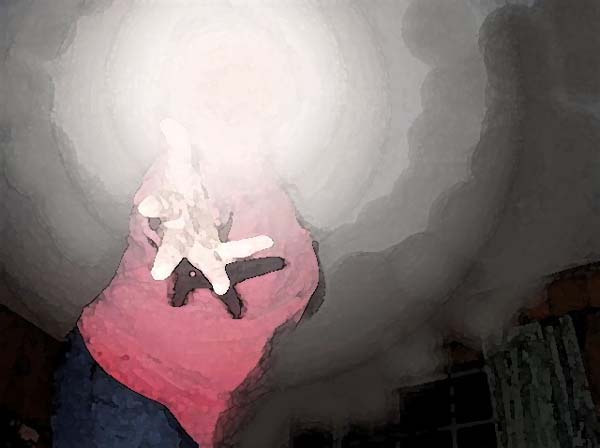
Other Side, art by Rose E. Grier

I Am Unhappy (Not-a-goth #1)CEE
Bless your fishnets, little trad, aren’t we all
|
Death of Children IIDan Fitzgerald
Clouds huddle
|
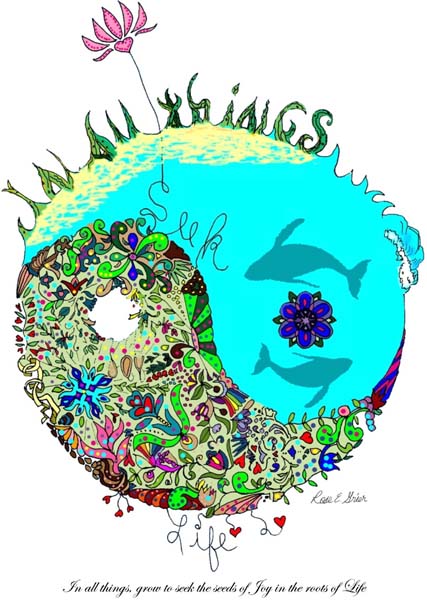
Seek Joy, art by Rose E. Grier


HitDana Stamps, II
When I played Little League, I struck out each at bat
fielder, surprised, stumbled backwards until
So I took off. My long ball did not go over the fence,
as I nearly tripped on second, but the excited
My step-dad shouted: That’s my son! That’s my
all cheering for me, for I actually hit the ball.
was a winner. That’s my son! my legal guardian
|
GoldieDana Stamps, II
Mother cleaned and polished grandma’s marker
When my redheaded grandmother Goldie died,
for a few years at home, then the stroke. She smoked
At the funeral, she looked porcelain white, and young
marker once. Spending the day on Mother’s Day I felt hollow, numb.
Why don’t you visit me more? I was your grandmother!
I would not be surprised if her spirit visited; she loved |
They shove my dinnerFritz Hamilton
They shove my dinner thru the hole in my cell door/ if
it’s for me to eat it/ the rat gets to it first & takes a few
filthy pillow/ Poe enters from my telltale heart wolfing down
soothe him by sharing my porridge, which pisses off my
sends the coat to Beaudelaire who fornicates with the rat.
wench is dead.” Beaudelaire finds the rat dead in his love its common name ...
! (burst
|
The ropes tangleFritz Hamilton
The ropes tangle & the two victims swing
the show% little children are there to see their
to hang as one% to celebrate their love by
falling in love & then they’re lovers% intolerable to the
our Western humanity by murdering them in the
oil as well% we’re so much better off by destroying !
|
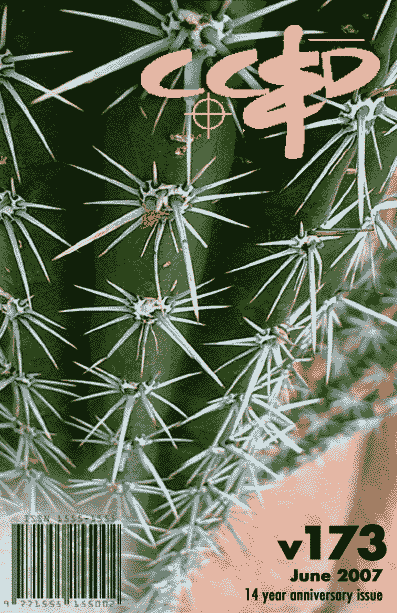
The Pros and Cons of ImmortalityOz Hardwick
Is it really so bad to begin with an ending?
But here I am, queuing for dreams
So, I ask again, is it really so bad
Because here – just half a century, but counting –
|
But for Sin
I.B Rad |
| Janet Kuypers reads the IB Rad poem But for Sin from cc&d magazine v243 |

See YouTube video of Janet Kuypers reading the IB Rad poem But for Sin in cc&d magazine live 6/5/13 in Chicago at her the Café Gallery poetry open mic (S) |
The cloak of invisibility
I.B Rad |
| John reads the IB Rad poem the Cloak of Invisibility from cc&d magazine v243 |

See YouTube video of Janet Kuypers reading this IB Rad poem in cc&d magazine live 6/12/13 in Chicago at her the Café Gallery poetry open mic (S) |
Tardive ArmyDevon Sova
I belong to an army
|
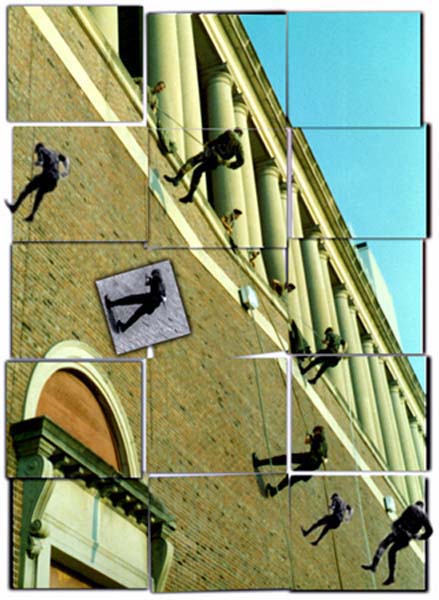
Throat Cancer and the Hungry NationWilliam Robison
again the long howl of obscene outrage
killer bitch sisters Katrina, Rita
bones roll twenty-seven come eleven
wise acres weigh in why’d you ignorant
to insult your intelligence only
|
William Robison BioWilliam Robison teaches history at Southeastern Louisiana University and has published considerable nonfiction on early modern England, his most recent work being The Tudors in Film and Television (McFarland, 2012), co-authored with Sue Parrill. For more info, see http://www.tudorsonfilm.com. He is also a musician and a maker of short films, both which the curious can check out at http://www.myspace.com/562067730. Poetry is a newer form of expression for Robison, but recently hwe has had poems accepted by Amethyst Arsenic, amphibi.us, Anemone Sidecar, Apollo’s Lyre, Asinine Poetry, Carcinogenic Poetry, decomP magazinE, Forge, Mayday Magazine, On Spec, and Paddlefish.
|
visibility...six feetR.F. Jordan
she can spell physics
yet my mission is not to destroy her
i merely wish to land my craft
vaulting decoys from the control tower
|
Superman Looking
Doug Draime |
| Janet Kuypers reads the Doug Draime poem Superman Looking Through A Microscope At Cells Dying from cc&d magazine v243 |

See YouTube video of Janet Kuypers reading the Doug Draime poem Superman Looking Through A Microscope At Cells Dying in cc&d magazine live 6/5/13 in Chicago at her the Café Gallery poetry open mic (S) |
Too Much Is SaidDoug Draime
of multitudes
in the heart of nothingness
|
Homage to CC&D
What school but unschooled; what religion but no religion; what politics but the prose and poetry itself, and above all, what edge but the one that the writers and poets make with their words, not with their poses, clothes, academic schools, religion, or politics, is the best way I can describe this magazine with the crazy and slightly kinky sounding title of “Children, Churches, & Daddies.” Editor Janet Kuypers told me what it meant a few times and if it never sank into my declining brain, the better for it, because like the publication it represents, it does not waive the flag of a specific school of poetry and politics as much as it just waives a red piece of cloth in front of a large but small brained beast. That’s what I feel makes CC&D so genuine (and makes me want to continue writing for it and not just submitting to it): Ms. K the editor doesn’t care where you went to Graduate school or what Outstanding journal you published in. While many writers and poets may envy such credentials, they also come with a price: be careful not to get too controversial, be carefully aware of what will advance your career as a poet or writer. CC&D doesn’t have to play that game. And in not having to play it, CC&D is one of the most honest and riskiest publications out there. True, it’s not only the one, but after twenty years? Hell, it’s hard for a small press poetry and prose publication to survive just a couple of years (regardless of whether or not your journal plays “politics”). Sure, the final judgment is left to Ms. Kupyers herself, but it’s a judgment that truly looks at the poetry and prose you submit to her. She doesn’t have to please an editorial board or a Department of Humanities or English; she only has to please her own irreverent, independent, and iconoclastic taste. (Hard to find just one of those qualities in our mass-conformist country today, much less all three of them, in one person). —Kenneth DiMaggio
|
Poem #2 from
Kenneth DiMaggio |
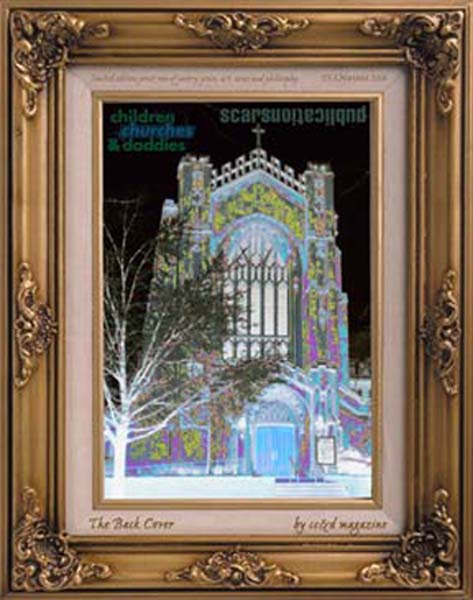
No Dr. StrangeloveMichael Ceraolo
It was one of the greatest surprises in recorded history,
|
|
Victim No MoreS. Progress
religion |
Remains UnquestionedBrian Looney
Racism is deeply rooted
Medieval depictions of demons,
Illustrations which taint perspective
Colors, shapes and piety,
That a Grandfather perspective,
|

photography from Brian Hosey and Lauren Braden
Sitting at a Bus Stop at SunriseCorey Cook
Sun radiates
|
| John reads the Corey Cook poem Sitting at a Bus Stop at Sunrise from cc&d magazine v243 |

See YouTube video of Janet Kuypers reading this Corey Cook poem in cc&d magazine live 6/12/13 in Chicago at her the Café Gallery poetry open mic (S) |
Corey Cook BiographyCorey Cook is the author of three chapbooks: Rhododendron in a Time of War (Scars Publications), What to Do with a Dying Parakeet (Pudding House Publications), and Flock (Origami Poems Project). His work has recently appeared in The Aurorean, Brevities, Commonthought, The Legendary, Muddy River Poetry Review, Nerve Cowboy, Smoky Quartz Quarterly, and Three Line Poetry. New work is forthcoming in Daily Love, The Germ, Leaves of Ink, and Milk Sugar. Corey works in New Hampshire and lives in Vermont.
|
The Things You Feel
Richard King Perkins II |
| John reads the Richard King Perkins II poem The Things You Feel Cannot Be The Things I Feel from cc&d magazine v243 |

See YouTube video of Janet Kuypers reading this Richard King Perkins II poem in cc&d magazine live 6/12/13 in Chicago at her the Café Gallery poetry open mic (S) |

|
poetry the intergalactic stuff |
| After watching the Hitchhiker’s Guide to the Galaxy (again), I thought I would see if the BBC could help me generate bad Vorgon poetry (since the worst fate to anyone in the galaxy is to hear Vorgons reading their poetry). This is what http://www.bbc.co.uk/cult/hitchhikers/vogonpoetry/lettergen.shtml came up with for me... |
Vogon Poem GeneratorJanet Kuypers2/12/13
ee, see the kind sky
|
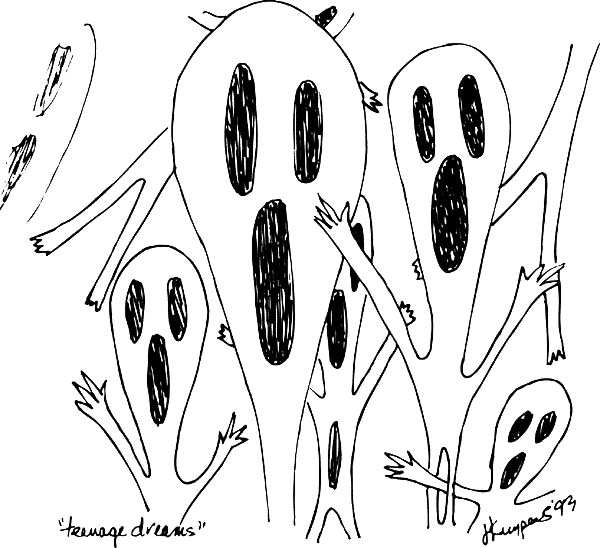
| But Star Trek fans, we can’t leave the Klingons or the Romulans out when it comes to interglactic or science fiction poetry... Forgive us if anyone out there knows more Klingon or Romulan, but below are translation attempts of the short poem “Fingers Black” into Klingon and the short poem “to be Free of You” into Romulan. |
Klingon Fingers Black
nItlhDu’ |
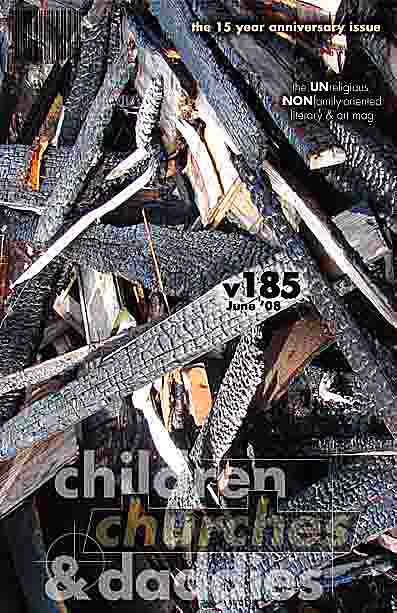
Romulans, free
uaefvalhuneitrde’h’n hvaedroalh |

|
Chicago Pulse “sweet poems, Chicago ” |
News FlashPepper Giese
Ho una condizione terminale
I have a terminal condition
|
Beach SceneBill Yarrow
Larry works the concession stand
|
| Bill Yarrow reads his poem Beach Scene from cc&d magazine v243 |

See YouTube video of Bill Yarrow reading his poem in cc&d magazine live 6/19/13 in Chicago at her the Café Gallery poetry open mic (S) |
haikuBruce Matteson
words in same boat |
| Janet Kuypers reads the Bruce Matteson poem Haiku from cc&d mag, v243 |

See YouTube video of Janet Kuypers reading this Bruce Matteson poem Haiku in cc&d mag, v243 (the 20 year anniversary issue) live 8/14/13 at the open mic the Café Gallery in Chicago |
SpyglassJenene Ravesloot
Bare legs pass, but not completely, pass
|
Casablanca. Take 2.Lucia Blinn
Ilsa, having boarded the plane
In this version, however, the film
|
Poet as SociopathEric S.
I enter the train thirsty
He is wearing sunglasses even though it’s night…
I own him now. I have kidnapped him. He belongs to me.
The train is rife with metaphors
Why just look at this metaphor sitting across from me and her three metaphor children.
The others jitter with a jubilant anxiety like they want nothing more than to make social change by becoming my metaphor.
And then there’s that metaphor standing next to me with a briefcase and perfect posture.
I am alone on this train.
|
2011Tom Roby
after tsunami
|
In honor of the 20 year Anniversary issue, Kuypers’ writings were chosen
based on the namesakes of Scars Publications and cc&d magazine for this issue.
Scars 1997Janet KuypersSummer 1997
I wear my scars like badges.
I have a scar over my left knee.
I have a scar on my right shin.
I have a circular scar on my left calf,
My cat scratched me on my wrist once
I tell people that if they wake up
|

Watch this YouTube video live, 18 Years of Beach Poets 08/31/08, Chicago |

Watch this YouTube video live at the Lake County 2010 Poetry Bomb at Independence Grove forest preserve 04/18/10 |

See YouTube video of Kuypers reading the poem Scars 1997 live 5/22/13 at the Café Gallery in Chicago (Sony) |

See YouTube video of Kuypers reading the poem Scars 1997 live 5/22/13 at the Café Gallery in Chicago (Canon) |

See YouTube video of Kuypers hosting the open mic 5/22/13 at Gallery Cabaret’s the Café Gallery in Chicago, including this poem |
Originally printed on v98 of cc&d magazine, December 1997
(which used clip art for varying covers, like the covers shown here).
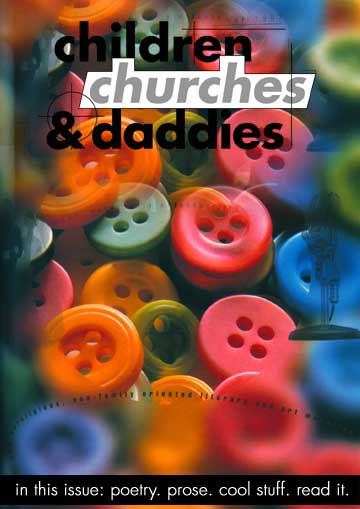
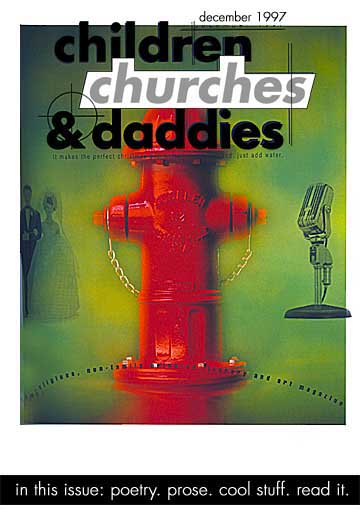
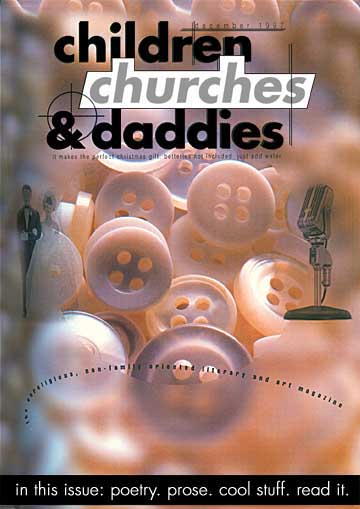
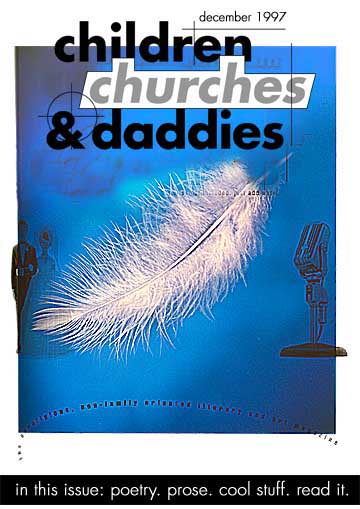
Scars 2000
Janet Kuypers |

Watch this YouTube video live at the show Questions in a World Without Answers 10/05/04, Chicago |

|

Order this iTunes track: from the poetry audio CD ...Or order the entire CD set from iTunes or Napster CD: |
Originally printed on v134 of cc&d magazine, 2/22/04,
but portions of it appears as performance art in v141, 10/22/04.
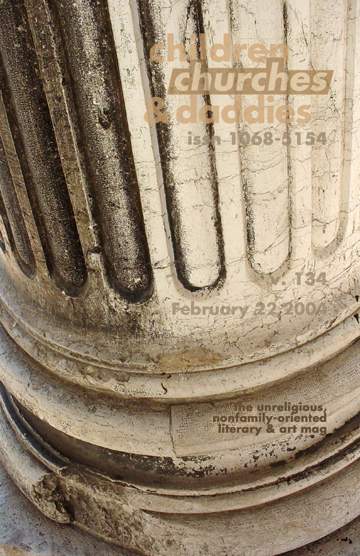

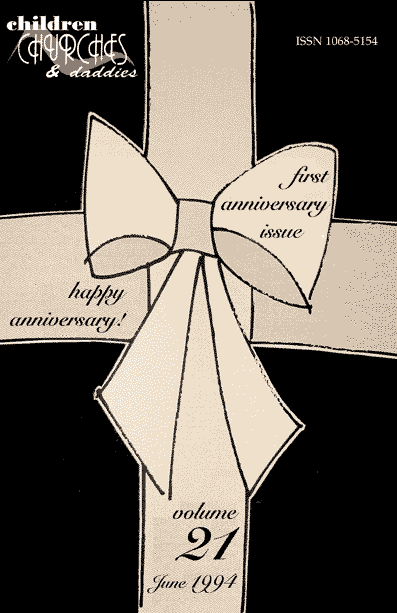
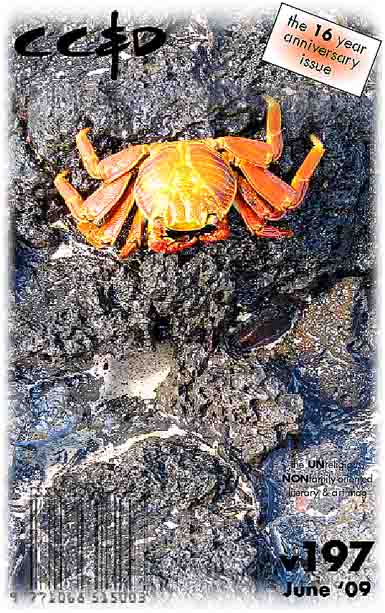
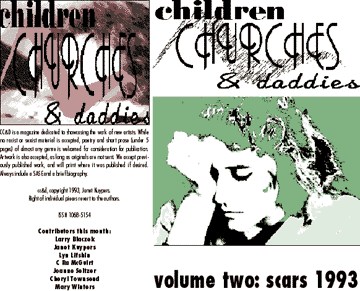
ScarsJanet Kuypers1991 Like when the Grossman’s German shepherd bit the inside of my knee. I was baby sitting two girls and a dog named “Rosco.” I remember being pushed to the floor by the dog, I was on my back, kicking, as this dog was gnawing on my leg, and I remember thinking, “I can’t believe a dog named Rosco is attacking me.” And I was thinking that I had to be strong for those two little girls, who were watching it all. I couldn’t cry. Or when I stepped off Scott’s motorcycle at 2:00 a.m. and burned my calf on the exhaust pipe. I was drunk when he was driving and I was careless when I swung my leg over the back. It didn’t even hurt when I did it, but the next day it blistered and peeled; it looked inhuman. I had to bandage it for weeks. It hurt like hell. When I was little, roller skating in my driveway, and I fell. My parents yelled at me, “Did you crack the sidewalk?” When I was kissing someone, and I scraped my right knee against the wall. Or maybe it was the carpet. When someone asks me what that scar is from, I tell them I fell. Or when I was riding my bicycle and I fell when my front wheel skidded in the gravel. I had to walk home. Blood was dripping from my elbow to my wrist; I remember thinking that the blood looked thick, but that nothing hurt. I sat on the toilet seat cover while my sister cleaned me up. It was a small bathroom. I felt like the walls could have fallen in on me at any time. Years later, and I can still see the dirt under my skin on my elbows. Or when I was five years old and my dad called me an ass-hole because I made a mess in the living room. I didn’t. Like when I scratched my chin when I had the chicken pox.
|

Order this iTunes track: from the Chaotic Collection ...Or order the entire 5 CD set from iTunes: CD: |
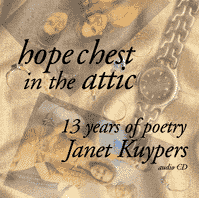
Order this iTunes track from the poetry audio CD Hope Chest In The Attic 13 Years of Poetry & Prose ...Or order the entire CD set from iTunes: |

Watch the YouTube video (2:58) live 04/15/09 at the Cafe |
|
Listen |

Watch this Youtube video of Janet Kuypers reading this prose “Scars” in Nashville TN 5/18/13 after her Tag Team feature reading |

Watch this Youtube video of Janet Kuypers reading “Scars” and “Children, Churches and Daddies” in Nashville TN 5/18/13 after the Tag Team feature reading |
Originally printed on v2 of cc&d magazine, July 1993.

Children, Churches, and DaddiesJanet KuypersSpring 1993
And the little girl said to me,
trying to make excuses for the can
wedding of two people
walking to their seats in
is central Illinois. And my date
the worst part was their father
laughed, but I hesitated.
Eve, my date’s family went up
hard enough, I don’t know the
stayed seated, and everyone else
little line, the little children
daddies. And the little girl trying to make excuses.
|
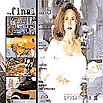
Order this iTunes track from the collection poetry music CD the Final ...Or order the entire CD from iTunes: |

Order this iTunes track from the poetry audio CD Hope Chest In The Attic 13 Years of Poetry & Prose ...Or order the entire CD set from iTunes: |

Order this iTunes track: in two locations: from the Chaotic Collection ...Or order the entire 5 CD set from iTunes: CD: |

Watch the YouTube video (1:48) live 08/05/07 at Beach poets |

Watch the YouTube video (2:00) 02/26/08, Live at the Cafe in Chicago |

Watch this Youtube video of Janet Kuypers reading this poem 5/18/13 “Children, Churches and Daddies” in Nashville TN after her Tag Team feature reading |

Watch this Youtube video of Janet Kuypers reading “Scars” and “Children, Churches and Daddies” in Nashville TN 5/18/13 after the Tag Team feature reading |
Originally printed on v1 of cc&d magazine, June 1993.
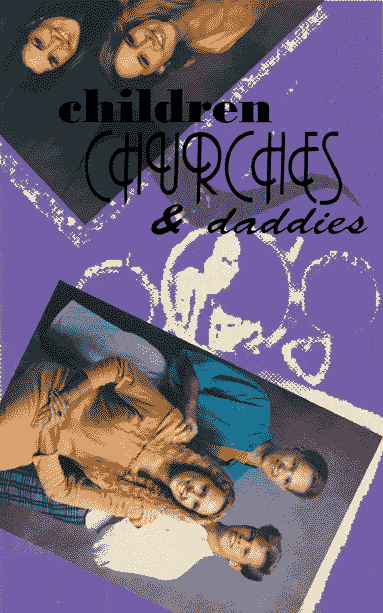


|
prose the meat and potatoes stuff |
A Miracle of AngelsBill Kroger
This story has been in my gut for months, since Father Kean passed. I know you won’t believe it – it’s hard for me to believe – but the evidence was there.
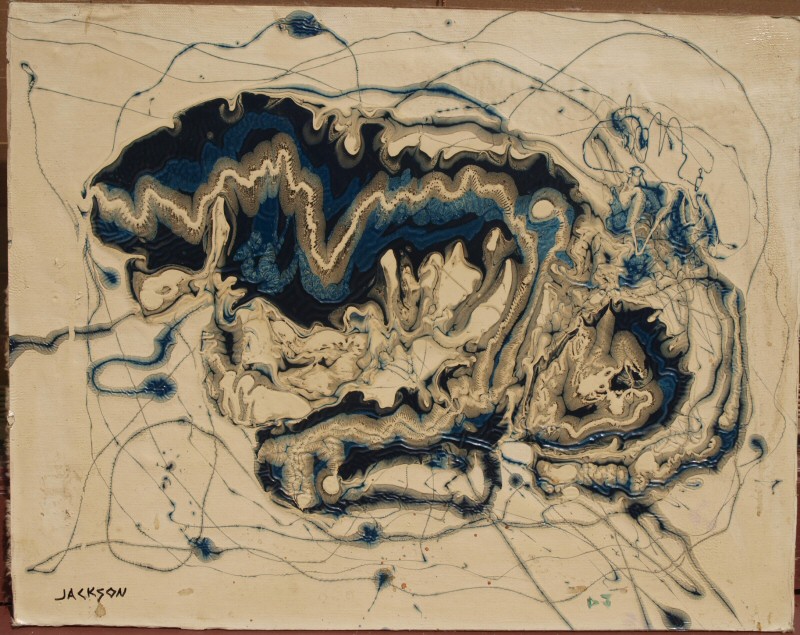 Drip Heaven, art by David Michael Jackson
The article wasn’t long and gave credit for the story to a newspaper in Tijuana. The gist was that Father Kean, the subject of the article, had been helping parishioners lead a protest against a Tijuana drug lord and that the priest had been targeted for a serious roughing up with potentially fatal consequences. The drug lord, apparently not one of the big guys but a minor lord, subsequently was arrested on a drug charge and told the police a tale hard to believe. He said that a few days earlier he and several of his men were hiding in an alleyway waiting to attack Father Kean as he came from a night meeting of his group of parishioners. As the father approached the area, they made ready to attack. Father Kean was alone and a ripe target, and just when they were ready to pounce, three other men, all seeming of college age, suddenly appeared beside the priest, walking with him and chatting among themselves. Father Kean seemed unaware of this sudden protection, the drug lord said. He added that the strangeness continued in that the three seemed to cast a shimmering light from their bodies, as if they weren’t real. But there they were, real enough. So the assault didn’t happen. Who would dare go after someone walking with ghosts?
 Birth, photography by Peter LaBerge
He then reached out, took my arm and pulled me closer. “You’ve got to help me!” he demanded, in a desperate way. I started to say something, but he held up his hand and continued speaking. His voice was raspy now.
|
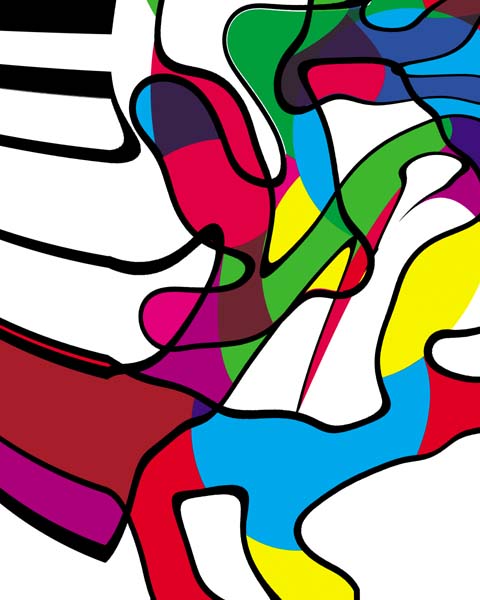
Angel at Rush Hour, art by Edward Michael O’Durr Supranowicz



They found her leg up a treeFritz Hamilton
They found her leg up a tree.

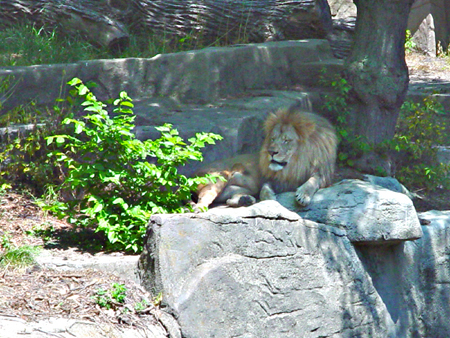
“Where’s a mountain lion?”
|

The Old Lady Eats Brother AnguishMel WaldmanAfter dark, the old cannibalistic lady craved blood and crushed bones. When she saw Brother Anguish, her twisted and gnarled psyche commanded her to obliterate the poor fellow, who stood about a foot smaller than she.
Why? The tall, skeletal beast, with sharp powerful teeth and jaws, like those belonging to the small, black, muscular Tasmanian devil, chased Brother Anguish into the guest room upstairs. The young man cried out in vain in his mother-in-law’s West Tisbury house. From afar, I heard her ferocious screams. It’s the Hellhound of Martha’s Vineyard, I thought. Did any other human hear her cutting, Satanic shrieks? Covered in a white shroud with white hair cascading down her narrow hips, she cornered Brother Anguish, grabbed his fragile head, opened her mammoth jaws, and bit into bone, flesh, and brain-matter. I rushed away and flew across phantasmagoria. Yet I witnessed the heinous crimes. I watched the old lady crush his skull, blood gushing fiercely and freely from the battered, broken brain-container. And soon, my frenzied, feverish eyes saw the old lady devour Brother Anguish, drinking blood, chomping skull shards, and biting hard into his shattered soul.
Even now, the old lady eats Brother Anguish,
|
BIOMel Waldman, Ph. D.Dr. Mel Waldman is a licensed New York State psychologist and a candidate in Psychoanalysis at the Center for Modern Psychoanalytic Studies (CMPS). He is also a poet, writer, artist, and singer/songwriter. After 9/11, he wrote 4 songs, including “Our Song,” which addresses the tragedy. His stories have appeared in numerous literary reviews and commercial magazines including HAPPY, SWEET ANNIE PRESS, CHILDREN, CHURCHES AND DADDIES and DOWN IN THE DIRT (SCARS PUBLICATIONS), NEW THOUGHT JOURNAL, THE BROOKLYN LITERARY REVIEW, HARDBOILED, HARDBOILED DETECTIVE, DETECTIVE STORY MAGAZINE, ESPIONAGE, and THE SAINT. He is a past winner of the literary GRADIVA AWARD in Psychoanalysis and was nominated for a PUSHCART PRIZE in literature. Periodically, he has given poetry and prose readings and has appeared on national T.V. and cable T.V. He is a member of Mystery Writers of America, Private Eye Writers of America, American Mensa, Ltd., and the American Psychological Association. He is currently working on a mystery novel inspired by Freud’s case studies. Who Killed the Heartbreak Kid?, a mystery novel, was published by iUniverse in February 2006. It can be purchased at www.iuniverse.com/bookstore/, www.bn.com, at /www.amazon.com, and other online bookstores or through local bookstores. Recently, some of his poems have appeared online in THE JERUSALEM POST. Dark Soul of the Millennium, a collection of plays and poetry, was published by World Audience, Inc. in January 2007. It can be purchased at www.worldaudience.org, www.bn.com, at /www.amazon.com, and other online bookstores or through local bookstores. A 7-volume short story collection was published by World Audience, Inc. in June 2007 and can also be purchased online at the above-mentioned sites. |
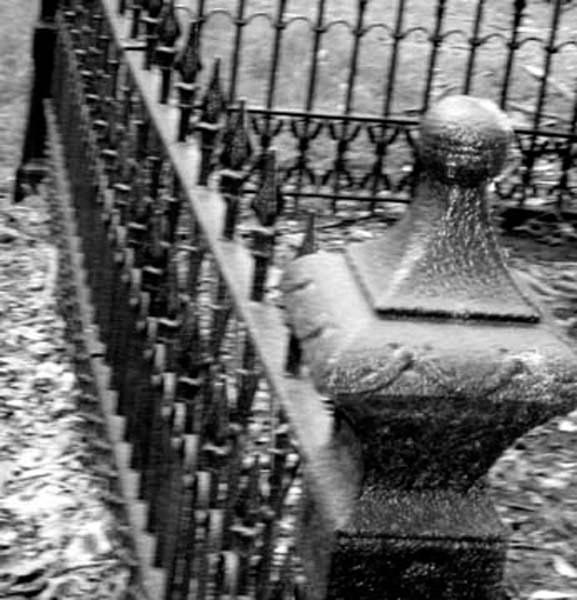
art by Cheryl Townsend
A Change of VoiceJohn Ragusa
Preston Pyre knew that the only way he’d be able to pay a gambling debt would be to rob a store. He simply did not have the money to pay what he owed to his gambling friends.
|
The Underwear FetishBob Johnston
Jack Shaughnessy, self-styled Defender of the Downtrodden, found himself in court on a Monday morning, badly hung over, defending one Annabelle Livingston. An ex-debutante with aggressively blond hair and the smile of an angel, Annabelle was hardly one of the downtrodden. She was charged with breaking and entering, armed robbery, and sexual assault. According to the police report, Annabelle had allegedly broken into the apartment of a single man while he was sleeping, rifled through his underwear drawer, left an erotic message in lipstick on the bathroom mirror, lay down beside the victim and fondled him until he awoke, then held him at gunpoint while she stuffed his underwear into a duffle bag and made her escape.
|
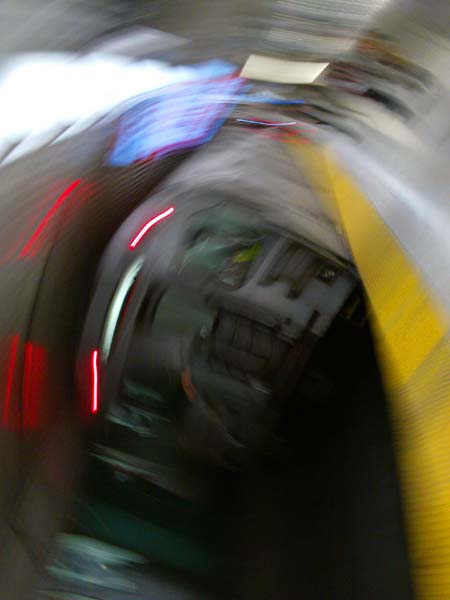
Uptown, art by Rex Bromfield
Red BinariesTabitha Holcombe
I rub my lips together pressing the red lipstick out evenly. My tongue runs across my front teeth as I adjust my rearview mirror to review my smile. Clean, white teeth and scarlet red lips. I look around at the brand new Mercedes that I bought with the life insurance money a few days ago. The scent of a new car, the smoothness of new leather seats yet to crack from sunlight and the dashboard a dark, unfaded shade of gray. These are things I have never experienced until now and I probably wouldn’t have either if it wasn’t for what happened. An associate professor’s salary was just enough, but not for frivolous luxury vehicles. It’s hard to think how much things have changed in the past three months. The thought of someone living in our house still hurts. I didn’t even go through his things; they were sold with the house. Zero, pi over two, pi, three pi over two.
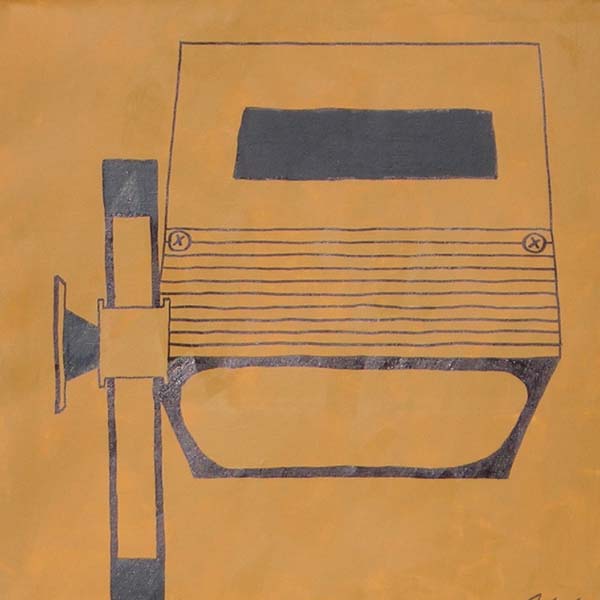 The Truth And Lies That Red Tape Hides, art by Aaron WilderWhen we get into the room, the smell of mold and mildew is over powering. Sullivan sits on the edge of the bed and when our eyes meet I feel sick. I need a drink, I say to myself. I grab the corkscrew and wine bottle he set on the table next to the door and hand it to him. Sullivan is the only man that I allow to pay me in wine. I hear him chuckle as he sits on the bed with the bottle. “Don’t judge me,” I say. “It’s hard not to.” “I know, but just don’t, okay?” “Fine, I won’t,” he lies with a smirk on his face. He uncorks the bottle carefully making sure not to spill it. He lifts it to his nose, taking in the fragrant smells of vintage wine. I hand him one of the plastic cups from on top of the dingy old microwave beside the door. He chuckles again. I feel the corners of my mouth as they involuntarily upturn into a big smile. I have to admit, it’s pretty comical to watch him pour expensive wine into a plastic motel cup. The smile fades soon though when I realize where I am and what’s about to happen. I just need this drink. He swishes the wine around the cup and takes a small sip. “It’s wonderful,” he says, his arm outstretched, cup in hand. I take the cup from him and bring it to my lips. I smell the strong aroma of grapes and then upturn it, taking all of it in in one short gulp. He tries to hide a smile as he pours himself a cup’s worth. I take off my trench coat and sit on the bed beside him. I look down towards my feet for what seems like eternity. “You know Harper, it doesn’t have to be like this,” he says sweetly beside me. My gaze turns from the beige carpet to his deep brown eyes. They haven’t forgotten me. My eyes haven’t forgotten his either. I keep thinking that faking love with Sullivan is better than accepting Blake’s death. The only way one can observe a black hole is by looking at all the matter that accumulates around it. When I’m away from Sullivan I feel myself being pulled towards the black hole Blake left in me. But when I’m with Sullivan, I feel like a star again. A single star. When Blake was alive we were two stars orbiting each other, a perfect binary. Scientists aren’t quite sure how binaries are formed. While it’s very unlikely for two stars to capture one another by gravity, it’s not totally impossible. The stars orbit an invisible point in the center where the gravity of each star balances the other out. Sometimes, because of distance, they appear as one star to observers here on Earth. That’s kind of like how me and Blake were; we were like one. When I first saw him, he captured me. After that, I was forever stuck in his gravitational field. We worked together, orbiting one another, revolving our lives around the other. When a star’s pressure becomes so great that it can’t resist its own gravity, it collapses. What’s leftover is a black hole. Black holes are invisible points of singularity so dense that nothing can escape it, not even light. When Blake died he became a black hole I couldn’t escape. So here I am, a lost lonely star being sucked in by something you can’t even see, stuck forever, bound by the laws of physics. “It will always be this way,” I say as I glance back towards my feet. Zero, pi over two, pi, three pi over two, two pi... “But it doesn’t have to be. Harper, I,” he starts. “Don’t,” I threaten. “Don’t you dare say it.” Before I have a chance to take the moment in, I’m on my feet with my handbag in one hand as my free hand digs through it. I grab my tube of red lipstick and throw the handbag back onto the grimy beige carpet. I walk fast towards the bathroom, the points of my heels stabbing at the ground. I slam the door shut and stare at myself in the mirror. I need another drink. I paint my lips scarlet and then admire them. He knocks at the door and I just inhale deeply and hold my breath.
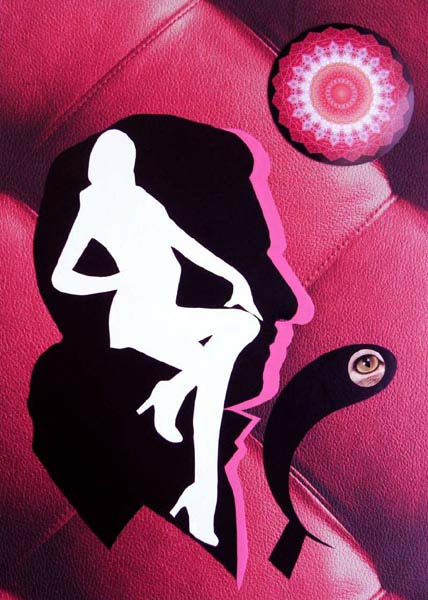 DSCN 2479UZEYIR14K, art by Üzeyir Lokman ÇAYCISummers of us laughing in the boat down by the lake, him in his sunglasses and me in my woven sun hat fill the dark room. The fragrances of roses laid down the hallway leading to an engagement ring invade my nostrils. The time we sat out on a blanket of grass under the stars with me pointing out all the constellations to him, us admiring the night sky together. When he spoke, I couldn’t help but listen; it was like bees carrying home nectar to make honey, his voice soft and sweet. Our wedding was small. We were surrounded by close friends and family, happy to finally be one. We were only married for four months. He was taken from me before we even had our first married fight, before we tried to have children, and before I even had a chance to say goodbye. “You should go,” I say firmly. “But,” he starts. “Leave!” I scream slamming the door to the bathroom shut again. I don’t what’s gotten into me this time. I wait until I hear the door to the motel close then I storm back into the bedroom. He always leaves the wine behind after our weekly rendezvous. What good is an opened bottle of wine to him other than an opportunity for his wife to find out that her husband isn’t faithful? Besides, I always enjoy it more than he would. Usually I take my time with it, savoring every sip like it was my last. Not tonight. I walk back into the bathroom so that I can put on more red lipstick after I drink. I just want to forget, so I turn it vertical, closing my eyes. I widen my throat so that it can flow down easier, like water through a pipe. Red wine streams down my chest, through my white bustier. It covers the cheap bathroom tile. When the bottle is empty I throw it to the floor and fall to my knees. Zero, pi over two, pi, three pi over two, two pi... It’s not working. My index fingers are creating furious circles, but nothing can erase Blake Flynn from my mind at this moment. Tears begin to fall like fat rain drops collecting on my cheeks and falling to my chest. There are no words to describe the pain I feel in my chest and my tears won’t make any room for more. I’ve never felt anything like this before. My hands fling to cradle my eyes like little accidental vessels, containing the rain. Why did this have to happen? Why did he leave? This is not what I planned! I sit on my knees, my hands still over my face for what I feel like is days. Finally, after crying every drop of liquid my body can muster, I stand up from the plastic floor. When I look in the mirror, I see red everywhere. My lips are blood red and my chest is stained a light shade of red too. Blake was right; the color red just doesn’t look good on me.
|

Double is RetiredEric Burbridge
Today his palms did most of the work. A rheumatoid arthritis flare up rendered his fingers almost useless. The rheumies, he called them, dangled like broken twigs on a branch under the metal box the owner of Dasso’s Pottery held in his arms. The meds hadn’t kicked in; he grimaced in pain moving it from the counter. The doorbell startled him and he almost dropped it. Who was that? He stopped and made adjustments. If he dropped it, the money in the false bottom might fall out. He sat it on the counter and parted the wooden blinds on the door. Marco! What the hell did he want? He hurried and put it away.
Priesthood, art by the HA!Man of South Africa
Gordie was not impressed with Marco’s nephew. He didn’t like him, a young version of the uncle; thinner, the same height with the same lifeless eyes and stringy brown hair. But, he learned quick and honed his skills as a pick-pocket. Then he made the young thief do some real work; toss junk in the dumpsters out back.
The training ended. “Thanks, Mr. Dasso. You won’t be disappointed in me,” his apprentice said. Gordie gave him a half smile and a handshake. Good riddance. He locked the front door and went in the back, got a small with lock-pick tools. He emptied the false bottom of his tool box and put the money in a bag. The van left and he scanned the trashy vacant lots across the alley on both sides of that strip mall. He studied the building’s exterior for security cameras or recessed bricks that could hide them. Several over loaded dumpsters lined the walls next to his objective with just enough room for his narrow frame to slip through.
He hadn’t heard from Marco in two days, on the third day he took out the garbage and saw yellow ‘do not cross’ tape strung across the door of the restaurant.
|

Bellevue Skyscrapers 2, art by Brian Forrest
Soul Fuel 501Eric Burbridge
“I know it’s not every day you stop someone driving their own fire truck, but it’s legal...and it’s mine. The other cops in this area know me. You could’ve pulled me over in the shade. It’s 100 degrees.” Evan Burgess wiped his forehead and sneezed when traffic wheezed by and kicked up dust and blankets of heat. His denim overalls reeked with smoke. They were too tight for his 6'5" frame, but he couldn’t find the one’s that fit. He dug in the tiny pocket. “Here’s my license and registration...you can read, can’t you?” The short muscular cop looked up at Evan and then at the papers, his eyes narrowed into a hateful stare and gave them back. Evan grinned; he got the cop’s goat. Now to really piss him off. “Let me give you a little history of this beauty.” He rubbed the truck and walked toward the front. “This is a ’67 Howe Defender. I converted it into a mobile BBQ. I’ve met all health department requirements. See the number on each side. It had a 1000 gallon water tank that pumped 750 gal/min; which I junked and made room for grilles and refrigerators. Now for the good part—.”
He made a there point turn and back into his cul-de-sac. He cussed and squeezed 501 between diagonal parked cars by the driveway. He blocked the tires and connected the power to charge the batteries. A ten minute shower and a rub on Clarisse’s stomach got him a kick from their unborn daughter. Twenty miles over the speed limit got him to the lawyer’s office with a few minutes to spare. He parked his early model blue Camry in a handicapped. This shouldn’t take long. He pushed the revolving door and his voice mail rang. “Evan...A Mr. Larry Goodman called saying he’s from some foundation. I forgot just, but it sounds important. Love you, bye.”
Evan didn’t feel his phone vibrate; he allowed his nemesis to distract him.
They strolled down the red carpet under the neon lit marquee and embraced each other like newlyweds. All the shops and restaurants were in back of the tables and machines. Laughter and celebration didn’t exist, replaced with concentration, faint ringing bells from slots and whiffs of smoke. Glitz and glamour couldn’t hide the disappointment Evan felt seeing the seasoned crowd relentless in their efforts to beat the house.
“Good morning, Goodman Foundation,” a smooth female voice said.
Evan ran around his office screaming and shouting gathering his files and plans. He calmed himself and wished he had Cooper’s gift of persuasion. In that area he felt like he’d amputated an arm.
A spring deluge subsided by the time Evan parked. He got there early to catch on some paper work. He stuck the key in the lock as Cooper pulled up.
|
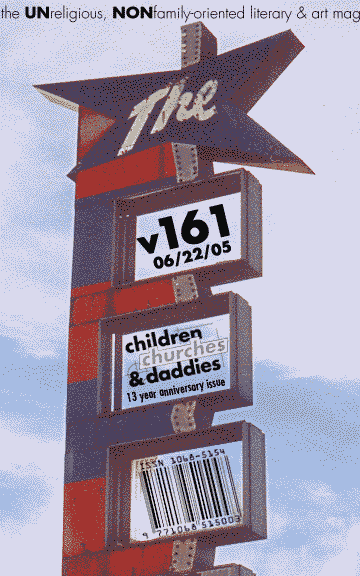
GripEric Burbridge
Cynthia Massey meant business. The 5'3" frail addict stepped from behind a huge oak tree and pointed a 9mm pistol at her victim’s chest. He froze. “Don’t move,” she said in a soft, but stern voice. She didn’t want to break the 2am silence. She knew he couldn’t identify her in the dark hoodie. “Empty your pockets...now.” The medium height and build uniformed mass transit worker frowned; his hands didn’t move. “Have it your way.” She squeezed the trigger. He groaned and lunged at her before his face slammed into the grass. “Mess with me, you fool.”
|

art by Erc Bonholtzer
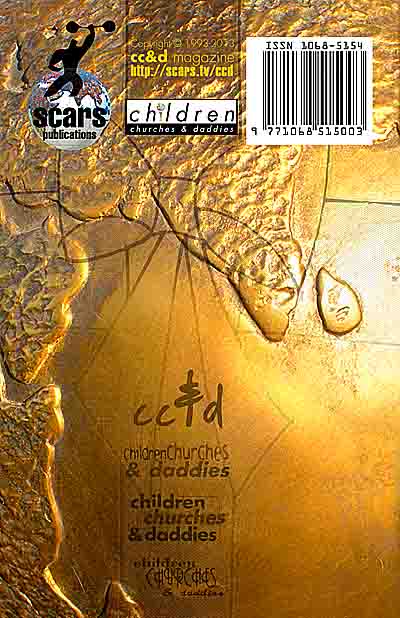

Debra Purdy Kong, writer, British Columbia, Canada I like the magazine a lot. I like the spacious lay-out and the different coloured pages and the variety of writer’s styles. Too many literary magazines read as if everyone graduated from the same course. We need to collect more voices like these and send them everywhere.
Children, Churches and Daddies. It speaks for itself. Write to Scars Publications to submit poetry, prose and artwork to Children, Churches and Daddies literary magazine, or to inquire about having your own chapbook, and maybe a few reviews like these.
what is veganism? A vegan (VEE-gun) is someone who does not consume any animal products. While vegetarians avoid flesh foods, vegans don’t consume dairy or egg products, as well as animal products in clothing and other sources. why veganism? This cruelty-free lifestyle provides many benefits, to animals, the environment and to ourselves. The meat and dairy industry abuses billions of animals. Animal agriculture takes an enormous toll on the land. Consumtion of animal products has been linked to heart disease, colon and breast cancer, osteoporosis, diabetes and a host of other conditions. so what is vegan action?
We can succeed in shifting agriculture away from factory farming, saving millions, or even billions of chickens, cows, pigs, sheep turkeys and other animals from cruelty. A vegan, cruelty-free lifestyle may be the most important step a person can take towards creatin a more just and compassionate society. Contact us for membership information, t-shirt sales or donations.
vegan action
Children, Churches and Daddies no longer distributes free contributor’s copies of issues. In order to receive issues of Children, Churches and Daddies, contact Janet Kuypers at the cc&d e-mail addres. Free electronic subscriptions are available via email. All you need to do is email ccandd@scars.tv... and ask to be added to the free cc+d electronic subscription mailing list. And you can still see issues every month at the Children, Churches and Daddies website, located at http://scars.tv
MIT Vegetarian Support Group (VSG)
functions: We also have a discussion group for all issues related to vegetarianism, which currently has about 150 members, many of whom are outside the Boston area. The group is focusing more toward outreach and evolving from what it has been in years past. We welcome new members, as well as the opportunity to inform people about the benefits of vegetarianism, to our health, the environment, animal welfare, and a variety of other issues.
Dusty Dog Reviews: These poems document a very complicated internal response to the feminine side of social existence. And as the book proceeds the poems become increasingly psychologically complex and, ultimately, fascinating and genuinely rewarding.
Dusty Dog Reviews: She opens with a poem of her own devising, which has that wintry atmosphere demonstrated in the movie version of Boris Pasternak’s Doctor Zhivago. The atmosphere of wintry white and cold, gloriously murderous cold, stark raging cold, numbing and brutalizing cold, appears almost as a character who announces to his audience, “Wisdom occurs only after a laboriously magnificent disappointment.” Alas, that our Dusty Dog for mat cannot do justice to Ms. Kuypers’ very personal layering of her poem across the page.
Fithian Press, Santa Barbara, CA Indeed, there’s a healthy balance here between wit and dark vision, romance and reality, just as there’s a good balance between words and graphics. The work shows brave self-exploration, and serves as a reminder of mortality and the fragile beauty of friendship.
Mark Blickley, writer You Have to be Published to be Appreciated. Do you want to be heard? Contact Children, Churches and Daddies about book or chapbook publishing. These reviews can be yours. Scars Publications, attention J. Kuypers. We’re only an e-mail away. Write to us.
The Center for Renewable Energy and Sustainable Technology The Solar Energy Research & Education Foundation (SEREF), a non-profit organization based in Washington, D.C., established on Earth Day 1993 the Center for Renewable Energy and Sustainable Technology (CREST) as its central project. CREST’s three principal projects are to provide: * on-site training and education workshops on the sustainable development interconnections of energy, economics and environment; * on-line distance learning/training resources on CREST’s SOLSTICE computer, available from 144 countries through email and the Internet; * on-disc training and educational resources through the use of interactive multimedia applications on CD-ROM computer discs - showcasing current achievements and future opportunities in sustainable energy development. The CREST staff also does “on the road” presentations, demonstrations, and workshops showcasing its activities and available resources. For More Information Please Contact: Deborah Anderson dja@crest.org or (202) 289-0061
Dorrance Publishing Co., Pittsburgh, PA want a review like this? contact scars about getting your own book published.
 The magazine Children Churches and Daddies is Copyright © 1993 through 2013 Scars Publications and Design. The rights of the individual pieces remain with the authors. No material may be reprinted without express permission from the author. 
Okay, nilla wafer. Listen up and listen good. How to save your life. Submit, or I’ll have to kill you.
Dorrance Publishing Co., Pittsburgh, PA: “Hope Chest in the Attic” captures the complexity of human nature and reveals startling yet profound discernments about the travesties that surge through the course of life. This collection of poetry, prose and artwork reflects sensitivity toward feminist issues concerning abuse, sexism and equality. It also probes the emotional torrent that people may experience as a reaction to the delicate topics of death, love and family. “Chain Smoking” depicts the emotional distress that afflicted a friend while he struggled to clarify his sexual ambiguity. Not only does this thought-provoking profile address the plight that homosexuals face in a homophobic society, it also characterizes the essence of friendship. “The room of the rape” is a passionate representation of the suffering rape victims experience. Vivid descriptions, rich symbolism, and candid expressions paint a shocking portrait of victory over the gripping fear that consumes the soul after a painful exploitation.
Dusty Dog Reviews (on Without You): She open with a poem of her own devising, which has that wintry atmosphere demonstrated in the movie version of Boris Pasternak’s Doctor Zhivago. The atmosphere of wintry white and cold, gloriously murderous cold, stark raging cold, numbing and brutalizing cold, appears almost as a character who announces to his audience, “Wisdom occurs only after a laboriously magnificent disappointment.” Alas, that our Dusty Dog for mat cannot do justice to Ms. Kuypers’ very personal layering of her poem across the page.
|
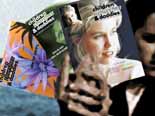
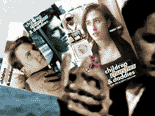
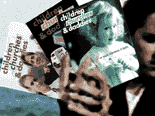
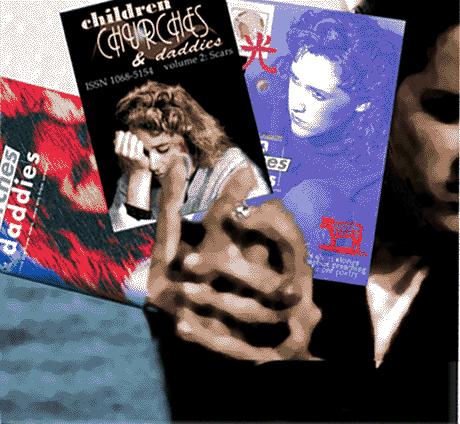
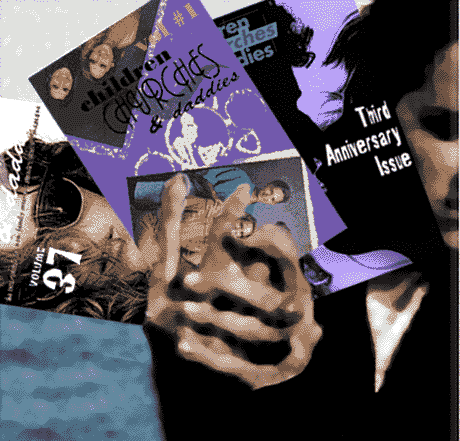
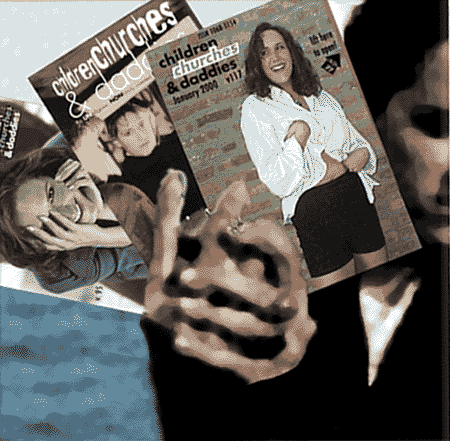
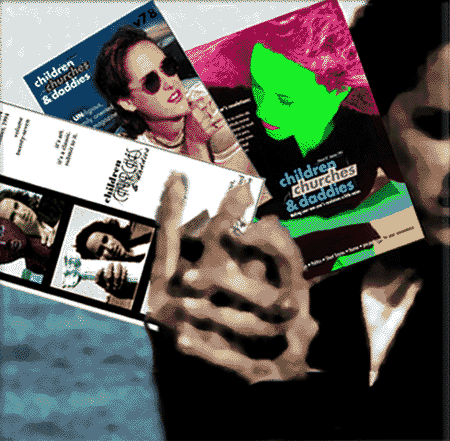
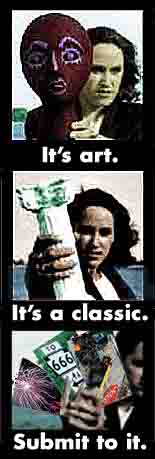

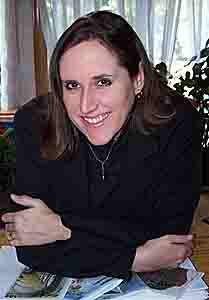


 I know I should just crank the car and leave. I should go somewhere else, or just get a room alone for the night. I shouldn’t be here doing this, waiting on a “client” to call me, but as usual I sit here frozen staring blankly at the airbag logo on the steering wheel in front of me. A sudden knock on the fiberglass window jolts me. What is he doing here? My heart sinks to the floorboard and I put on my best surprised smile as my window glides down, breaking the transparent barrier between us.
I know I should just crank the car and leave. I should go somewhere else, or just get a room alone for the night. I shouldn’t be here doing this, waiting on a “client” to call me, but as usual I sit here frozen staring blankly at the airbag logo on the steering wheel in front of me. A sudden knock on the fiberglass window jolts me. What is he doing here? My heart sinks to the floorboard and I put on my best surprised smile as my window glides down, breaking the transparent barrier between us.
